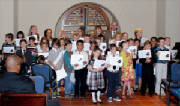|
|
Piano Lessons for Children and Helpful Hints! 
|
||||||||||||||
|
Parents and Guests of the MisterEvan
website -- Raising
Your Child's IQ Recently (1997), Dr. Frances
Raucher and Dr. Shaw of the University of Wisconsin and University of Irvine, Ca, have definitively concluded that piano lessons
raise overall IQ in children 5-8 years 3 to 4 points More though, increased spatial mathematical reasoning skills by 34%.
Young beginners score 34% higher than the control group on tests designed to measure spatial-temporal reasoning skills --
those required for mathematics, chess, science, engineering. Computer training in contrast scored no higher than the control
group. Conclusion? Piano competency generates the neural connections used for abstract reasoning and understanding mathematical
concepts.
Mr
Evan's Reward System... When teaching piano to children, my first step is rapport. The goal
is for the student to feel that MrE is a cool and a with-it guy that is interested in lots of things...besides the piano.
I take a Holistic approach. I really want to know where their minds are. Sure the goal is for their mind to be centered
on learning piano. Yet, in order to get there, one has to know what else is going on in the young person's life. If
young Sally just came back from dance and soccer, and is going to do a sleep tonight, I want to know about it...because
if so, the lesson plan is going to change. Asking "How are you?" at the beginning of each lesson helps
my students communicate and let me know what is going on in their lives. Sometimes it is quite surprising what comes up. The
purpose is to have a really successful piano experience and a relationship with my students encouraging them to love
the instrument, spend the time necessary to practice, and raise the value of playing on their list of
priorities. The results are quite surprising to parents. "I never have to ask him to practice -- he just sits down
and does it" or, "I can't get them off the piano" are phrases that I hear from parents quite frequently. So
creating the relationship, praise and encouragement with my students is number one. This is working on the inside-out for
my students to really feel good about their progress and their piano accomplishments. Children being who they are and teens,
often need more than a relationship and encouragement. For example, when teaching my son words, at first, he did not
want to read...later a different story. My rewards with him included many extrinsic rewards...Stickers, toys, money...these
things are part of an external reward system. I often ask myself during a lesson if I were the parent of this
child what would I do to show them that playing the piano is of great importance? Students really get to know that their playing
piano is very important to me. Without a parent's all important interest though, all efforts that I might make are diminished
in value. Sometimes parents expect me to take care of it all...The good news is parents can do so much to enhance their child's
natural interest in music. In short order, we can be successful at completing the triangle power loop between student,
parent, and teacher. (MisterEvan
is always available to give lessons at his very well equipped in- home studio, with playstation, games and
waiting room!) Rapport and Laughter with my Students How serious is the average 5 year old? Not very.The number one goal of any teacher should
be and needs to be rapport. Every student is different.One of the great joys of teaching is to find out how each young person relates, then reach to that
level where they can say to themselves "Hey, I get this! "How is this done???Well, building confidence for starters. Truly,
a lot of parents have had a neighborhood piano teacher who seemed overly concerned with accuracy and holding hands in a certain
shape and even using a ruler as a knuckle rapper! I ask you...how much confidence can be built using a yardstick? So my goals are different: Building confidence and enthusiasm is everything in this teacher's mind. The learning will happen when the confidence precedes Praise to the sky, stickers, and sense of humor, are an important
part of my teaching tool box. Fun is an integral part of my teaching style...no matter what age my student might
be!....and I am serious about this! My adult students know this the best of all. Just can't believe how much fun we have
together! The Importance of the Recital... Recitals bring together
a group of students who have been working by themselves for 6 months. It is great fun to be part of a group with a common
mission: to become good at music and piano. When students hear others play, they see that they are not really alone, that
there are musical goals that others are accomplishing, and it serves them to set their sites higher on the piano performance
ladder. Their efforts are valued by other students and parents! That is why it is a powerful experience and significant and
you want to make every effort to be there!! Each recital interestingly enough, has a personality of its own. It is the celebration
of my student's efforts and have found it to be very exhilarating..if it doesn't go on too long!!! :)
|
Piano Lesson Quotes from MisterEvan: 1. "Middle C is the same on the page for both hands...stem goes up for one and
down for the other! 2. "It took me thirty years to figure out that fingers of the C scale going up, are the
same exact finger numbers going down!" 3. "The C scale fingering is: 123 HOP 12345" 4. "pinky goes on g" 5. "It takes 3 chords to play 90% of music." 6. "Heart and Soul is a great way
to learn 4 of your chords" 7. "There are 7 letters on the keyboard....ABCDEFG...that's all!."
Click here: Sing to MrE's America the Beautiful
|
|||||||||||||


